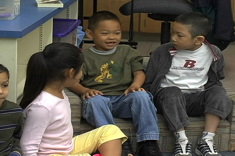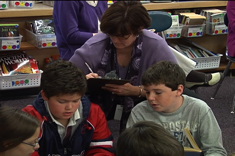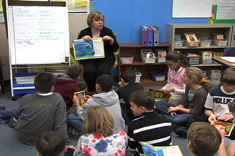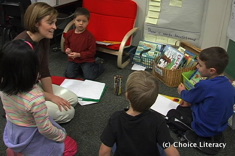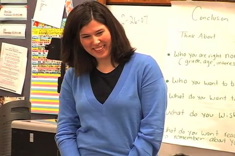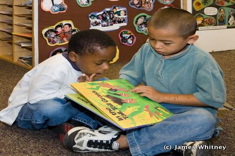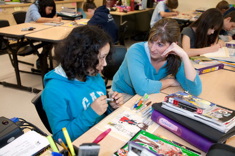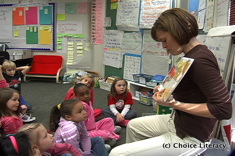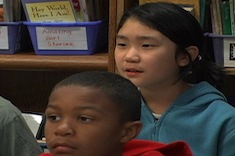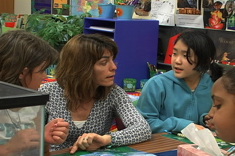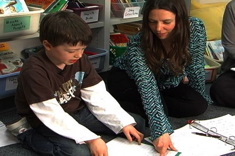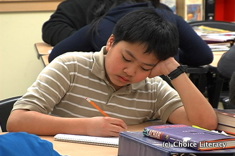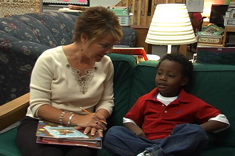Articles
Here is where you’ll find all the latest print features from our contributors. If you’d like to browse specifically by grade level, topic, or contributor, you can use the links in the right sidebar.
Latest Content
5th Grade Grandfather
Misunderstandings abound when working with struggling readers and writers. Jennifer Jones connects an experience in her personal life to one student she is supporting and gains new insight.
My Colleague Refuses to Collaborate with Us (LITERACY COACH CONFIDENTIAL)
What do you do about a colleague who refuses to collaborate with other teachers on her grade-level team? Literacy Coach Confidential takes on the problem, with suggestions from seven Choice Literacy contributors.
A Coach’s Perspective: Is Sarcasm in Style This Season?
When is sarcasm appropriate in classrooms? Never, yet more is popping up all the time in schools, even from teachers. Here is some advice for dealing with sarcasm.
Bilingual (English/Spanish) Books that Celebrate Language, Family and Culture
Stella Villalba shares her favorite bilingual (English/Spanish) books for helping young English language learners feel at home in new classrooms early in the year.
Twitter Me This: Using Cell Phones to Build Literacy Skills and a Reading Community
Lisa Koch found herself a bit irritated as her high school students would discreetly send text messages as she tried to teach them literary terms. Her solution? Tweet tweet! You can read here about her successful summer experiment of tweeting literary terms and staying in touch with students over summer reading assignments.
Making the Case for Literacy Coaches
If your district is considering cuts to its literacy coaching program, you’ll appreciate Shari Frost’s advice.
Picture Books for Shared Reading
Shared reading builds skills and community in Katie DiCesare's 1st grade classroom.
Sarcasm Is a Useful Teaching Tool — NOT
How does sarcasm hurt students? Heather Rader counts the ways.
Thinking About 5th Grade Read Alouds
Karen Terlecky develops a plan for read alouds with her 5th grade students. She explains her choices, comparing selections to last year's list.
A Sponge is a Summary
Heather Rader shares a concrete analogy that students (and teachers) love for understanding how summaries work.
Using Summer Reading to Expand the Whole School Reading Community
What big messages do we give to students with summer reading assignments? Franki Sibberson considers this question and shares the template she sends home with children of all ages.
Book Basket Idea: Cars and Trucks
Katie DiCesare remembers books that were fought over among the boys in her 1st grade classroom, and this leads to creating a new basket for the fall on cars and trucks. She shares a booklist of fun titles in the basket.
There’s Been a Misblunderstanding
We're teachers and we have a tendency to talk too much. Heather Rader explains how she coaches a teacher through the problem.
The DIBELS Divide (LITERACY COACH CONFIDENTIAL)
A curriculum coordinator loves DIBELS; a first-grade teacher doesn't. We provide a range of suggestions from our contributors on dealing with disagreements over assessment. This article is useful for teachers and literacy leaders who are working together with assessment data early in the year, no matter what evaluative system your school or district has in place.
Mentoring from the Real to the Ideal: Mental Images of Teaching
We know the power of mental images as a strategy for helping readers comprehend difficult text. Suzy Kaback uses a similar technique to help novice teachers envision success. Thisl is an activity you might want to try with a new teacher group.
Learning from Coaching Mistakes
Inventors understand that early prototypes inform them best about what doesn't work rather than what does. But what about when prototypes are people? Heather Rader reflects on risk-taking, failure, and learning as a literacy coach.
Not Available in a Six-Pack: Books to Place Alongside Leveled Texts for Our Youngest Readers
Teachers of young children often face the difficult choice of using leveled books that aren't necessarily engaging, or children's literature that isn't as easy to peg for readability. Franki Sibberson is on the hunt for wonderful children's literature that can easilysupplement or replace those lowest level "six-packs" of texts.
The Book Lovers Quilt Project
Katie Doherty and Ruth Shagoury present a fun way to launch (or close) the year with middle schoolers and discover the best-loved books of students from previous years. This project can be adapted for any age level.
Accurate But Not Quite Fluent: Books for Second-Grade Readers in Transition
Many second-grade readers are in transition – they can decode almost any text and are eager to read chapter books. Yet many don't have the stamina for reading even very short chapter books on their own. Katie DiCesare presents a booklist of her top picks of new fiction and nonfiction books that might engage and challenge her second-grade students.
Wii Summary
Heather Rader coaches a 6th grade teacher as she helps her students write better summaries.
Towards Thoughtful Strategy Instruction
Sometimes the pendulum swings so hard in education that it’s hard not to feel whiplash. Shari Frost considers critiques of strategy instruction, analyzing what’s valid and what’s not in attacks on the flurry of post-its in classrooms.
Mentor Texts for Urban Students
What texts work best for students with urban backgrounds? Shari Frost has suggestions for teachers.
Expedition Mondays: Launching the Week with Nonfiction
Expedition Mondays launch every week in Andrea Smith's classroom with a healthy dose of nonfiction.
Getting and Giving Student Feedback
How can we help students be more reflective in our classrooms, giving us the feedback we need to make them better places for learning? Heather Rader has suggestions.
Triangulating: The Importance of Multiple Data Points When Assessing Students
No data point for any child stands alone. Clare Landrigan and Tammy Mulligan write about the importance of triangulating data when looking at student assessments, and in the process affirm the value of classroom observations.
Dear Mrs. T: Moving Students from Summaries to Rich Response
Karen Terlecky shares how student letter writing about books has evolved over the years. The secret? Karen uses student letters from previous years as mentor texts for moving her 5th graders from summaries to more sophisticated responses.
What’s the Most Beautiful Thing You Know About…?
Ruth Shagoury and Melanie Quinn asked their colleagues to share the “most beautiful thing” about the puzzling student each of them is looking at closely in their study group. This is a great activity you’re looking for a quick and easy icebreaker to spark some positive energy in your next study group or staff meeting, and remind everyone of the joys of our profession.
Just Because It’s Skinny, Doesn’t Mean It’s Easy: Matching Books to Transitional Readers in Grades 2-4
Franki Sibberson writes about her evolution in choosing books for transitional readers in grades 2-4. Franki includes a handy list of criteria for evaluating whether new short chapter books are appropriate for young readers.
Conferring with Children: Principles and Procedures
“The Sisters” (Gail Boushey and Joan Moser) share their principles and procedures for conferring in the classroom.
Opening Classroom Doors
Clare Landrigan and Tammy Mulligan share many nonthreatening techniques to break down resistance among teachers to classroom visits and collaboration.
Browse Content By
Type
Category
- Assessment Tools
- Big Fresh Archives
- Booklists
- Choice Numeracy
- Classroom Design
- Common Core
- Community Building
- Conferring
- Content Literacy
- Digital Literacy
- English Language Learners
- Equity
- Family Relations
- Free Samples
- Guiding Groups
- Leadership
- Literacy Coaches
- Mentor Texts
- Minilessons
- New Teacher Mentors
- Podcasts
- Poetry
- Quote Collections
- Reading Strategies
- Self Care
- Struggling and Striving Learners
- Talking and Listening
- Teacher Study Groups
- Teaching Reading
- Teaching Writing
- Word Study and Vocabulary
Author
- Melissa Quimby
- Nawal Qarooni
- Gwen Blumberg
- Julie Cox
- The Lead Learners
- Hannah Tills
- Josie Stewart
- Ruth Metcalfe
- Mallory Messenger
- Becca Burk
- Jodie Bailey
- Vivian Chen
- Mary Brower
- Tiffany Abbott Fuller
- Stephanie Affinito
- Ruth Ayres
- Leigh Anne Eck
- Heather Fisher
- Shari Frost
- Julie Johnson
- Suzy Kaback
- Gigi McAllister
- Shirl McPhillips
- Melanie Meehan
- Cathy Mere
- Debbie Miller
- Tara Barnett and Kate Mills
- Tammy Mulligan
- Dana Murphy
- Bitsy Parks
- David Pittman
- Brenda Power
- Heather Rader
- Matt Renwick
- Mandy Robek
- Christy Rush-Levine
- Gretchen Schroeder
- Jen Schwanke
- Brian Sepe
- Katherine Sokolowski
- Stella Villalba
- Jennifer Vincent
Grade Level
Choice Literacy Membership
Articles
Get full access to all Choice Literacy article content
Videos
Get full access to all Choice Literacy video content
Courses
Access Choice Literacy course curriculum and training




